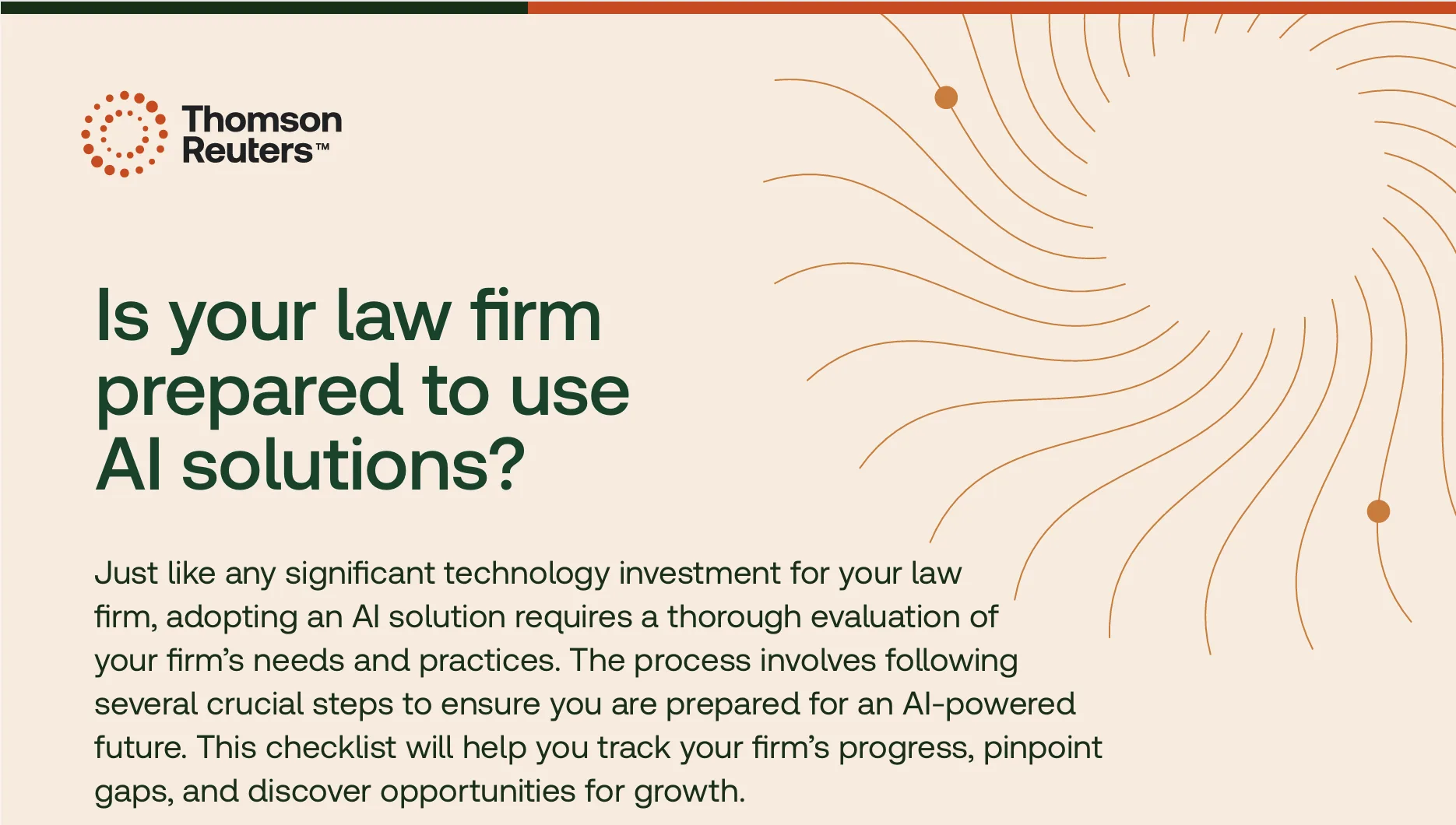A business readiness assessment is the critical first step every law firm should take to effectively adopt AI
Highlights
- A business readiness assessment is a resource for law firms to strategically adopt AI. Evaluating a firm's infrastructure, processes, and team skills helps maximize an AI investment.
- Successful AI implementation varies by firm size and requires a tailored approach, from cost-effective solutions for solo practitioners to customized, risk-managed platforms for large global practices.
- As AI becomes integral to legal services, firms must also proactively communicate their use of the technology to clients to build trust and demonstrate enhanced value.
As AI gains momentum in the legal industry, law firms must evaluate their readiness for this evolving technology.
According to a recent Thomson Reuters survey, 59% of law firms and 57% of corporate legal departments believe generative AI (GenAI) should be applied to their work. With 28% of law firms and 23% of corporate legal departments already integrating this technology, now is the time to assess your firm’s readiness.
A well-conducted business readiness assessment can guide firms through the key steps for successful AI integration, focusing on infrastructure, processes, and team skills. When you understand how AI affects client relationships and service delivery, you navigate the integration process with confidence.
If you’re looking for this resource, our new white paper, “How prepared is your law firm for AI integration?” guides law firms through identifying practice gaps and opportunities to fully leverage AI today.
Jump to ↓
Key considerations for successful implementation
Maximizing your AI investment
Adopting an AI platform requires careful evaluation of your firm’s readiness. A strategic assessment helps identify key opportunities and ensures successful integration tailored to your unique needs.
To maximize your investment, evaluate these areas:
- Infrastructure: Review your current systems for AI compatibility.
- Processes: Identify repetitive, time-intensive tasks in your workflows that AI can streamline, such as document review, legal research, and document summarization.
- Training: Assess your team’s AI proficiency and develop plans for staff training and adoption support.
Key considerations for successful implementation
The white paper explores six questions you should ask to begin your evaluation, including:
- The state of your legal tech stack today
- Current ethical AI usage guidelines
- Areas AI can have the biggest impact on your firm
Firm size
The scope and complexity of a readiness assessment varies significantly based on firm size:
Solo and small law firms
- Budget considerations: Budget limitations demand attention. Choose cost-effective and financially feasible solutions with reliable vendor support.
- Time management: AI should help save time on routine tasks, enabling solo practitioners to focus more on client interactions and case strategies.
Midsize law firms
- System integration: Gauge how well the AI platform will integrate with existing systems such as case management and document management tools. Ensure the solution enhances collaboration and internal communication.
- Scalability: Select a solution that grows with your practice, adapting to changes in workload and team size.
Global large firms
- Customized solutions: Large firms often require more customized solutions to meet the diverse needs of their practices across multiple jurisdictions. Close collaboration with the AI vendor and internal tech staff is crucial.
- Risk management: The AI solution must handle vast amounts of data and provide advanced analytics for strategic decision-making, while also managing cross-border compliance issues.
The client communication gap
Recent research shows most legal clients remain unaware of whether their law firms utilize AI technologies. This knowledge gap presents both a challenge and an opportunity.
With AI playing a more central role in legal practices, be sure to communicate openly about its use to uphold client trust and demonstrate the value it brings.
Today’s lawyers must understand how to effectively discuss AI’s role in legal services, from enhanced efficiency to information security considerations.
Why wait?
As a legal professional, you are standing at a pivotal moment. With AI technology advancing at an unprecedented pace, and more law firms recognizing its potential, the focus has shifted from deciding whether to use AI to exploring the best ways — and the right speed — to put it into practice.
The firms that effectively adopt AI today will be the ones leading the industry tomorrow, while those that delay risk being left behind.
A thorough business readiness assessment isn’t just a preliminary step — it’s your roadmap to AI success. Whether you’re a solo practitioner who wants to maximize efficiency on a tight budget, a midsize firm seeking scalable solutions, or a global practice requiring customized implementations, understanding your unique readiness profile matters.
The window of opportunity is narrowing. As AI technology continues to evolve and mature, early adopters will gain significant competitive advantages in efficiency, client service, and cost management.
Download our comprehensive white paper today and take the first step toward positioning your practice at the forefront of legal innovation. The future of law is being written now — make sure your firm is holding the pen.

White paper
How prepared is your law firm for AI integration? A legal industry business readiness assessment for AI
Access white paper ↗









